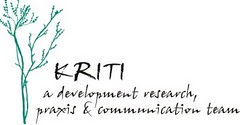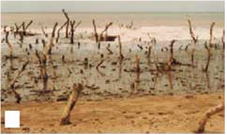Wildlife
Renukaji Dilli Ke Nalon Mein - A documentary about the movement against the proposed Renukaji Dam Project
Posted on 18 Jun, 2010 05:22 PMThe Renuka Dam Project proposed over the river Giri Ganga (a tributary of the Yamuna) located some 300km away from Delhi, is a joint project of the governments of Himachal Pradesh (HP) and Delhi, to be constructed by the Himachal Pradesh Power Corporation Limited (HPPCL) in Sirmaur district of HP.

Eco Festival 2010 : Films on water, wildlife & the environment, Kriti Film Club, New Delhi
Posted on 01 Jun, 2010 12:46 PM
13th annual birding fair at Jaipur's Man Sagar
Posted on 10 Nov, 2009 05:52 PM13th Birding Fair at Jaipur's Man Sagar on 2 – 3 Feb 2010 to be devoted to 'Rivers’ Restoration'
State of the environment report - Tikamgarh district - Madhya Pradesh (2009)
Posted on 03 Oct, 2009 10:25 PMThis report on the state of the environment in Tikamgarh district, prepared by Development Alternatives, provides a summary of the environmental attributes and condition of the district and the human impacts on the environment. It also provides a public record of district authority, industry and community activities and achievements in responding to pressures on the environment. The purpose of this report is to bring out an overview of the environmental scenario of the district to serve as a baseline document and assist in logical and information based decision making.
References of the impact of climate change on river deltas and other coastal areas
Posted on 26 Aug, 2009 04:48 PMMumbai Marooned: An Enquiry into Mumbai Floods 2005 - Final Report ,
By Conservation Action Trust - Click here
Enquiry-mumbai-floods-2005-final-report
Andhra Pradesh State of the Environment: A report from ENVIS
Posted on 11 Aug, 2009 04:00 PMThe Andhra Pradesh State of the Environment Report is available at the Environmental Information System (ENVIS) cell of the Ministry of Environment and Forests (MoEF) here.
Legislations on environment, forests, and wildlife by Ministry of Environment and Forests
Posted on 18 May, 2009 11:09 AMThis site by the Ministry of Environment and Forests provides the list of legislations on environment, forests, and wildlife
Memorandum: Scrap Renuka dam project
Posted on 12 May, 2009 11:25 AMForwarded to the Portal by: Himanshu Thakkar, SANDRP
Submission Sent to Prime Minister, DJB, Ministry of Water Resources & HP Govt.
A memorandum demanding the scrapping of the proposed Renuka Dam Project in Sirmaur, Himachal Pradesh was sent to the Prime Minister, Union Minister of Water Resources, the Delhi Jal Board, the Central Water Commission and the Ministry of Social Justice today by concerned environment groups as well as representatives of the dam affected communities. The 5 page detailed submission has made this demand on three basic grounds - technical/conceptual issues, environment implications and the social impacts of the project. Attacking the very root and concept of the project the memorandum highlights the point that the agreement that was signed in May 1994 is no longer valid, as per the opinion of the Union Ministry of Law and Justice, since Rajasthan, one of the parties, did not sign the agreement. The Delhi Jal Board has admitted in response to an RTI application that no options assessment has been done to arrive at the least cost option before taking up the Renuka dam proposal. Without such an assessment, taking up a proposal like the Renuka dam would be completely wrong and inappropriate use of public resources. Moreover, several Studies have proved that Delhi itself is thirsty not because there is shortage of water but actually due to mismanagement and misappropriation of water. According to the Performance Audit report of the Delhi Jal Board for 2008, Delhi has distribution losses of 40 per cent of total water supply which is abnormal and significantly higher than the acceptable norms of 15 per cent prescribed by the Ministry of Urban Development.
New initiative: "Odisha Mangrove Action Network"
Posted on 08 Dec, 2008 01:18 PMThis post deals with the recommendations and outcomes of the recent workshop on "Mangrove Forest Ecology, Management and Restoration" held at Rajanagar (boundary of Bhitrakanika National park) on 26th-27th November 2008, organized by Action for Protection of Wild Animals (APOWA) and sponsored by Ministry of Environment and Forets, Govt of India. The workshop was attended by 101 participants from the community representatives, teachers and lecturers of coastal schools and colleges, NGOs, CBOs, PRIs, Govt authority, Scientists, researchers, media etc. Witnessing firsthand the rapid devastation of the Orissa's mangrove forest wetlands and their associated coastal ecosystems, the participants, resource persons were recommended to form a network to save the mangroves.
Environmental flows for Indian rivers:Need for a discussion to consider the health of the riverine ecosystems
Posted on 24 Apr, 2008 11:58 PMIndia is facing a water crisis in nearly all the sectors. Fortunately or unfortunately, measures taken by the related authorities to combat the crisis often depends on the amount of 'noise' made by the relevant stakeholders. It is no wonder then, that the urban India, and especially the rich and the powerful in urban India, seldom have to face problems related to water scarcity, water quality or the sheer inequity in distribution. On the other hand, weaker the stakeholder, more severe are his ( rather 'her') problems. Marginal farmers, tail enders in a canal network, rural and urban poor, especially children and women, stand testimony to this situation. We all agree to this, right? 
Godavari delta, destruction of mangroves
But aren't we forgetting the the weakest, and in some ways, the strongest, of all the stakeholders? How about the ecosystem of the river itself??





